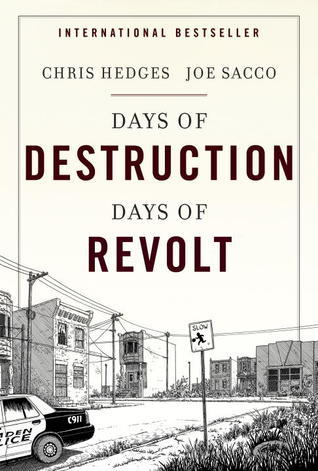What do you think?
Rate this book


320 pages, Paperback
First published January 1, 2012
the decline of america is a story of gross injustices, declining standards of living, stagnant or falling wages, long-term unemployment and underemployment, and the curtailment of basic liberties, especially as we militarize our police. it is a story of the weakest forever being crushed by the strong. it is the story of unchecked and unfettered corporate power, which has taken our government hostage, overseen the dismantling of our manufacturing base, bankrupted the nation, and plundered and contaminated our natural resources.two years ago, hedges and sacco set out to visit areas of the united states that have long been the victims of varying forms of exploitation, neglect, and degradation. the common thread shared by these forlorn locales is that each, in its own way, has served as the sacrificial setting (with individuals, families, once-enduring ways of life, and the environment as the sacrificed) to the insatiable appetites of corporate profit and greed. their book recounts the time they spent in these places, ably portraying the stories of not only the locations themselves and their sorrowful declines, but also the inhabitants and citizens that have long borne witness and suffered (and continue to do so) the abuses they are all but powerless to combat.
as societies become more complex they inevitable become more precarious and vulnerable. as they begin to break down, the terrified and confused population withdraws from reality, unable to acknowledge their fragility and impending collapse. the elites retreat into isolated compounds, whether at versailles, the forbidden city, or modern palatial estates. they indulge in unchecked hedonism, the accumulation of wealth, and extravagant consumption. the suffering masses are repressed with greater and greater ferocity. resources are depleted until they are exhausted. and then the hollowed-out edifice collapses. the roman and sumerian empires fell this way. the mayan elite became, at the end, as the anthropologist ronald wright notes in a short history of progress, "...extremists, or ultraconservatives, squeezing the last drops of profit from nature and humanity." this is how all civilizations, including our own, ossify and collapse.as hedges and sacco were nearing completion of their book, a group consisting of a few hundred activists in a lower manhattan park "unwittingly triggered a global movement of resistance that would reverberate across the country and the capitals of europe." occupy wall street took aim at corporate greed, corruption, cronyism, and the undue influence corporations have over democracy. as an antipode to the impotence found in the desolated regions they visited earlier, zuccotti park represented a vitality and intensity that offered a differing account to the one proffered by the monolithic corporate media. as they had done elsewhere, hedges and sacco listened, interviewed and reported upon the burgeoning movement as it grew from its infancy. whereas hope had been but an abstraction in camden, pine ridge, immokalee, and west virginia, in new york city they witnessed collective aspirations amounting to a clarion call for restorative justice.
the devastation of pine ridge, in camden, in southern west virginia, and in the florida produce fields has worked its way upward. the corporate leviathan has migrated with the steady and ominous thud of destruction from the outer sacrifice zones to devour what remains. the vaunted american dream, the idea that life will get better, that progress is inevitable if we obey the rules and work hard, that material prosperity is assured, has been replaced by a hard and bitter truth. the american dream, we now know, is a lie. we will all be sacrificed. the virus of corporate abuse- the perverted belief that only corporate profit matters- has spread to outsource out jobs, cut the budgets of our schools, close our libraries, and plague our communities with foreclosures and unemployment. this virus has brought with it a security and surveillance state that seeks to keep us all on a reservation. no one is immune. the suffering of the other, of the native american, the african american in the inner city, the unemployed coal miner, or the hispanic produce picker is universal. they went first. we are next. the indifference we showed to the plight of the underclass, in biblical terms our 'neighbor,' haunts us. we failed them, and in doing so we failed ourselves. we were accomplices in our own demise. revolt is all we have left. it is the only hope.
"[A]ny American who has eaten a winter tomato, either purchased at a supermarket or on top of a fast food salad, has eaten a fruit picked by the hand of a slave... That’s not an assumption. That’s a fact." -U.S. Attorney Douglas MolloyOn the fields of Immokalee, which sell tomatoes to the nation's leading grocery chains and fast food restaurants, there's no job protection, no health benefits, no overtime pay. Growers flagrantly disregard requirements not to spray pesticides while workers are picking in the fields. Undocumented workers, because of their lack of legal status, often inability to communicate in English, economic hardship, and fear of deportation are particularly prone to abuse. Many are in a cycle of debt peonage on the scale of indentured servitude, having incurred a debt to come to America in search of a better life, and many leaving or dying having been unable to pay it off. In Immokalee, it was not uncommon for day laborers ofto sleep 10 to a trailer because of its proximity to the worksite in hopes of being handpicked for another day's work, or for female laborers to be sexually assaulted or else lose their meager wages. This chapter makes me never want to eat another tomato I didn't grow on my own. Devastating.